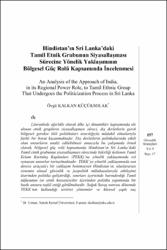| dc.contributor.author | Küçüksolak Kalkan, Övgü | |
| dc.date.accessioned | 2022-05-11T14:48:02Z | |
| dc.date.available | 2022-05-11T14:48:02Z | |
| dc.date.issued | 2013 | |
| dc.identifier.issn | 1305-4740 | |
| dc.identifier.uri | https://app.trdizin.gov.tr/makale/TVRReU5EYzNOdz09 | |
| dc.identifier.uri | https://hdl.handle.net/20.500.11776/10589 | |
| dc.description.abstract | Literatürde ağırlıklı olarak ülke içi dinamikler kapsamında ele alınan etnik grupların siyasallaşması süreci, dış devletlerin gerek bölgesel gerekse ikili politikaları aracılığıyla müdahil olmalarıyla farklı bir boyut kazanmaktadır. Dış devletlerin politikalarında etkili olan unsurların analiz edilebilmesi amacıyla bu çalışmada örnek olarak, bölgesel güç rolü kapsamında Hindistanın Sri Lankadaki Tamil etnik grubunun siyasallaşması sürecinde liderliği üstlenen Tamil Eelam Kurtuluş Kaplanları (TEKK)na yönelik yaklaşımında rol oynayan unsurlar tartışılmaktadır. TEKKye yönelik yaklaşımında son derece araçsalcı bir yaklaşım benimseyen Hindistanın, uluslararası sistemin ulusal güvenlik ve jeopolitik mülahazalarıyla etkileşimi üzerinden politika geliştirdiği, sınırları içerisinde barındırdığı Tamil nüfusunun ise etnik hassasiyetler üzerinden politika yapımında bir baskı unsuru teşkil ettiği görülmektedir. Soğuk Savaş sonrası dönemde TEKKnin kullandığı terörist yöntemler ve küresel çaplı suç örgütleriyle girdiği iş birlikleri üzerinden bölgesel gücün güvenliğini tehdit eder konuma gelmesi, devletlerle çatışan etnik örgütlere verilen dış desteğin sebebiyet verebileceği tehlikeyi ortaya koyar niteliktedir | en_US |
| dc.description.abstract | The politicization process of ethnic groups, which is mostly studied under the dynamics of domestic politics in literature, acquires a different dimension by the intervention of foreign powers through their regional and bilateral politics. With the aim of understanding the role of the factors which influence the policy-making process, the present study evaluates the factors affecting the approach of India, under the framework of a regional power role, to the Liberation Tigers of Tamil Eelam (LTTE) as the leader of the politicization process of Tamil ethnic group. Adopting an instrumentalist approach regarding the LTTE, India has developed its politics through the interaction of international system with its national security and geopolitical considerations, whereas the existence of Tamil population on its soil represents a pressuring factor by the ethnic sensitivities in the policymaking process. In the post-Cold War era, the LTTE has threatened the national security of India through the usage of terrorist activities and collaboration with the international criminal organizations. This aspect has shown the degree of danger brought by the support provided to the ethnic groups conflicting with the states. | en_US |
| dc.language.iso | tur | en_US |
| dc.rights | info:eu-repo/semantics/openAccess | en_US |
| dc.subject | Etnik Çalışmalar | en_US |
| dc.subject | Tarih | en_US |
| dc.subject | Uluslararası İlişkiler | en_US |
| dc.subject | Siyasi Bilimler | en_US |
| dc.title | Hindistan'ın Sri Lanka'daki Tamil etnik grubunun siyasallaşması sürecine yönelik yaklaşımının bölgesel güç rolü kapsamında incelenmesi | en_US |
| dc.title.alternative | An analysis of the approach of india, in its regional power role, to Tamil ethnic group that undergoes the politicization process in Sri Lanka | en_US |
| dc.type | article | en_US |
| dc.relation.ispartof | Güvenlik Stratejileri Dergisi | en_US |
| dc.department | Rektörlüğe Bağlı Bölümler, Rektörlük | en_US |
| dc.identifier.volume | 9 | en_US |
| dc.identifier.issue | 17 | en_US |
| dc.identifier.startpage | 157 | en_US |
| dc.identifier.endpage | 200 | en_US |
| dc.institutionauthor | Küçüksolak Kalkan, Övgü | |
| dc.identifier.trdizinid | TVRReU5EYzNOdz09 | en_US |



















